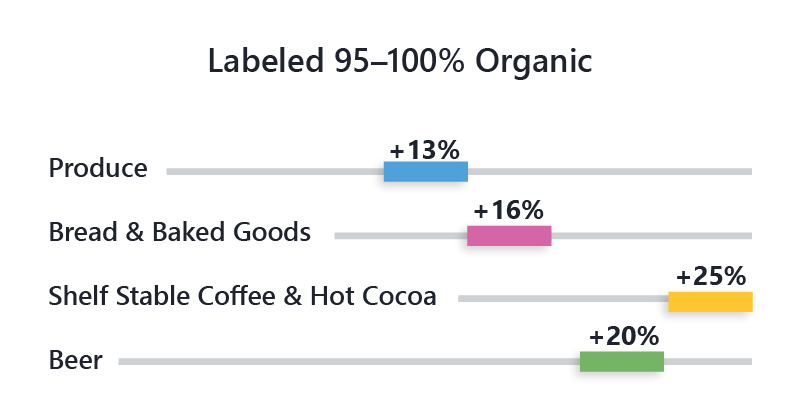Sustainable Products Address Climate Issues
As climate crisis emerges as a top issue for consumers, it is important to meet this need every step of the way and in every department of the store. In the same way, it is becoming more critical to source ingredients for food/beverage that will have a lower environmental footprint, it is just as important to think about packaging, supplements, body care, and general merchandise.
Here are key considerations consumers have in mind when choosing products responsibly, and ones that retailers and brands should keep in mind to better connect with sustainable shoppers.
Sustainable Shoppers Prefer Organic
While there is a debate as to how much organic farming reduces carbon emissions due to the increase in land required to supply the same amount of food, organic practices (less fertilizer use, lower animal density, no chemical inputs) lead to sustainability benefits of improved environmental soil condition and an increase in soil and wildlife biodiversity.
Consumers have noticed and products labeled as organic between 95-100% are up in all channels. Growth is largest in SPINS proprietary Regional Independent Grocery channel, with organic products up almost 21%. This is because consumers are going to their Regional and Independent grocers, who are nimble enough to bring in the products that customers are desiring alongside more conventional items as well.
Every department is getting in on the action with Organic Beer up 20% Cross channel and up 55% in Regional Independent Grocery.

Focus on Zero-Waste Packaging
Being sustainable goes well beyond the ingredients in the products. Choose items that are using recycled materials and supporting companies that are on a mission to reduce waste and carbon footprint. The EPA cites packaging as a significant source of waste, and shoppers are taking notice. As noted in our Body Care insights report, look for brands like that are using recycled plastic, and biodegradable packaging. Even pet brands are rethinking how they package their products.
Or better yet, no packaging at all! Toiletries are huge waste makers by traditionally coming in plastic containers—think of shampoo bottles and body wash. As packaging continues to factor into buying decisions, retailers will be looking to stock less wasteful forms of common items. Look for bars to start to replace liquid versions in toiletries like shampoo and conditioner, and the addition of surprising items like shave bars.
Retailers: Keep Sustainability Top Of Mind
If you aren’t sure if the ingredients in products are eco friendly and sustainable, you are not alone. These things can be tricky to figure out. SPINS is here for you. Utilize our Product Intelligence to identify brands and products that are committed to sustainability.
- Not sure if that tuna is sustainably caught? Check to see if it is certified through Marine Stewardship Council.
- Want peanut butter that isn’t using palm oil that contributes so heavily to deforestation and has negative impacts on wild life–utilize our ingredient attributes to pick out the products not using palm oil. We know that generally speaking, animal agriculture has a greater impact on carbon emissions than plant–based ingredients.
- Find products in animal centric categories that have made the swap to plant-based alternatives by using our plant–based diet and positioning attributes.
Our data is here to show you which products to keep on your shelf that the ever–growing sustainability consumer is looking for.
Brands: Keep Up With Sustainability Trends
Find out what attributes support sustainability in your category to help you promote what you’re already doing and where there are opportunities to pivot towards a more sustainable future.




